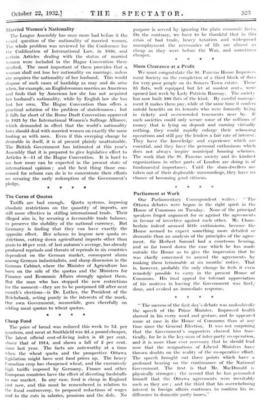Married Women's Nationality The League Assembly has once more had
before it the vexed question of the nationality of married women.
The whole problem was reviewed by the Conference for the Codification of International Law, in 1930, and certain Articles dealing with the status of married women were included • in the Hague Convention there drafted. The most important of them provides that a woman shall not lose her nationality on marriage, unless she acquires the nationality of her husband. This would dispose of such cases of hardship as may and do arise when, for example, an Englishwoman marries an American and finds that by American law she has not acquired her husband's nationality, while by English law she has lost her own. The Hague Convention thus offers a practical solution of the problem of statelessness ; but it falls far short of the Rome Draft Convention approved in 1923 by the International Women's Suffrage Alliance, which demanded in effect that the world's nationality laws should deal with married women on exactly the same footing as with men. Even if this sweeping change be desirable in itself, it is at present plainly unattainable. The British Government has intimated at this year's Assembly that it is prepared to give legislative effect to Articles 8-11 of the Hague Convention. It is hard to see how more can be expected in the present state of international opinion ; and the best thing those con- cerned for reform can do is to concentrate their efforts on securing the early redemption of the Government's pledge. * * * *














































 Previous page
Previous page